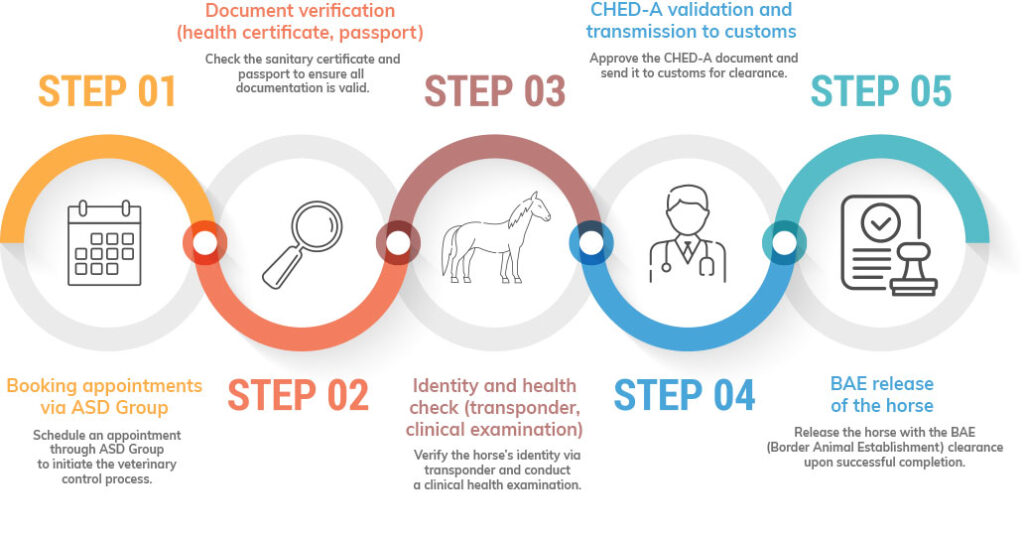Since the Brexit transition, the international transport of horses between the United Kingdom and the European Union has changed significantly. What was once a simple administrative procedure is now governed by strict customs formalities and mandatory veterinary checks.
Whether you are a breeder, professional rider, horse transporter, or competition organiser, understanding these new rules is essential to ensure the welfare of your horses and the compliance of your procedures.
This article provides a comprehensive overview of horse customs formalities, the required documents, and the benefits of entrusting your procedures to an expert like ASD Group, a recognised specialist in customs and veterinary logistics.
The post-Brexit context and its impact on horse transport
Since 1 January 2021, the UK has been considered a third country with respect to the European Union. This means that the movement of live animals, including horses, between the two zones is now subject to:
- Import or export customs formalities;
- Strengthened health and veterinary controls at the first point of entry into the EU.
Before Brexit, a rider could cross the Channel with their horse to participate in a competition with minimal administrative requirements. Today, after Brexit, every movement must be declared, checked, and documented, even for just a few hours.
No exemptions exist, even for temporary equestrian competitions.
These new rules aim to ensure:
- Traceability of live animals,
- Prevention of equine diseases,
- Compliance with European health standards.
Understanding horse customs formalities between the EU and the UK

Customs formalities for horses vary depending on the purpose of the movement: permanent import, export, or temporary transit for competitions.
Permanent import of a horse
When a horse is sold by a UK owner to a buyer in the EU, several factors determine the necessary procedures:
- The buyer’s tax status (VAT-registered or not),
- The geographical location of the importer.
Depending on these factors, taxes and VAT are calculated and collected differently.
The main form to complete is the Single Administrative Document (SAD), which formalises the horse’s entry into the European territory.
As a Registered Customs Representative (RCR), ASD Group supports clients throughout these procedures and ensures fiscal and customs compliance.
Temporary import for competitions or events
Horses travelling to participate in equestrian competitions or horse races enter the EU temporarily.
They must therefore undergo:
- A temporary import declaration on entry,
- Re-exportation upon return to the UK.
Two solutions exist:
Standard customs procedures
This involves completing a temporary import declaration and then a re-export declaration when the horse returns. This procedure is comprehensive but can be longer.
ATA carnet (temporary admission)
Issued by chambers of commerce, this document greatly simplifies the process.
It works as an administrative passport for goods and animals travelling temporarily abroad.
Each movement requires a visa from both UK and EU customs, ensuring traceability of the horse.
An ATA carnet covers a complete round trip, with each voucher endorsed at every stage of the journey.
The ATA carnet: a key tool for temporary horse movements
The ATA carnet is an effective alternative for equestrian professionals.
It simplifies horse customs formalities with suspension of duties and taxes while ensuring transparency of movements.
However, even with an ATA carnet, customs and veterinary checks remain mandatory:
- Verification of the horse’s identity,
- Check of accompanying documents,
- Recording of the movement in the TRACES system.
Veterinary checks and the role of SIVEP
Importing or exporting live horses is not limited to customs procedures. A detailed health inspection is carried out by SIVEP (Veterinary and Phytosanitary Inspection Service) at the first point of entry into the EU.
Required documents and certificates
For each horse, the following must be provided:
- Commercial invoice indicating the horse’s origin,
- Equine passport and health record,
- Health certificate (HC) issued by UK authorities,
- Information on the transport vehicle and driver.
Once validated, a health declaration is created in TRACES (TRAde Control and Expert System), the EU’s official system.
This declaration, called Common Health Entry Document – Animals (CHED-A), must be approved before entry into France.
Steps of the SIVEP control

- Appointment scheduled by ASD Group with SIVEP.
- Document check: verification of the health certificate in TRACES.
- Identity and physical check: verification of the transponder and horse’s health status.
- Validation of the CHED-A and transmission to customs.
- Once the check is approved, customs issues a Release Order (BAE) authorising the truck’s release.
Why entrust your procedures to a SIVEP expert like ASD Group
Transporting live horses requires precision, coordination, and rigour between multiple parties (veterinarians, transporters, customs, SIVEP).
A simple oversight or document error can block a horse at the border.
This is why relying on a horse customs formalities expert like ASD Group is a real advantage.
ASD Group provides:
- Complete preparation of customs and veterinary files before departure,
- Appointment scheduling with SIVEP and presence during the check,
- TRACES/CHED-A registration and customs coordination,
- Real-time tracking via the my-asd.com platform,
- Personalised support in case of disputes or counter-analysis.
With its experience and network, ASD Group ensures smooth transit, reduced stress for the animal, and full compliance with EU regulations.
Risks of non-compliance
Administrative or health errors are common:
- Incomplete or poorly drafted certificates,
- Missing SIVEP appointment,
- Incorrect TRACES declaration,
- Non-compliant equine identification.
These errors often result in:
- Border delays,
- Boarding or quarantine fees,
- Forced return to the country of origin,
- Or even administrative seizure of the animal.
Given that a competition horse can be worth tens or even hundreds of thousands of euros, the financial risk is significant.
Working with an accredited provider like ASD Group secures the entire process.
The European regulatory framework for the import/export of equines
The transport of live horses in Europe falls under Regulation (EU) 2016/429, known as the “Animal Health Law”, and its implementing regulations:
- Commission Delegated Regulation (EU) 2020/692,
- Commission Delegated Regulation (EU) 2020/688,
- Commission Implementing Regulation (EU) 2021/403.
These texts set the conditions for the movement and importation of equidae, whether they come from another Member State or a third country.
Each horse must be accompanied by a health certificate issued by an official veterinarian and registered in TRACES (Trade Control and Expert System).
For imports from outside the EU, it must be proven that the exporting country is recognized as “free” from regulated equine diseases (such as African horse sickness or piroplasmosis).
Non-compliance can lead to refusal of entry, quarantine, or return of the horse.
SIVEP: the key link in SPS and veterinary controls
The SIVEP (Veterinary and Phytosanitary Inspection Service) is the French service that carries out SPS controls at borders. At the European level, this is referred to as Border Control Post (BCP) or veterinary BIP.
When a horse passes through, the SIVEP performs:
- a documentary check (certificate, equine passport, TRACES / CHED-A data);
- an identity and health check (transponder verification, clinical examination);
- an in-depth health check, with sampling if necessary.
Inspections take place at the first point of entry into the EU. A delay or anomaly blocks customs clearance.
Equine import/export operations therefore require meticulous preparation and smooth coordination between transporter, veterinarian, SIVEP, and customs.
The risks associated with a non-compliant file
Without support, errors are common:
- incomplete or poorly drafted certificates,
- incorrect TRACES data,
- inaccurate equine identification,
- absence of appointment at SIVEP,
- non-compliance with quarantine periods.
These defects often lead to costly blockages:
Holding, return of the animal, additional analyses, or even administrative seizure.
In the equine sector, where the value of a horse can exceed €100,000, the financial risk is considerable.
A SIVEP expert acts as compliance insurance and guarantor of logistical fluidity.
Glossary of key customs and health terms
| Term | Meaning |
|---|---|
| SAD | Single Administrative Document: official import/export form in the EU |
| TRACES | European system for managing health and veterinary declarations |
| CHED-A | Common Health Entry Document (live animals) |
| SIVEP | Veterinary and Phytosanitary Inspection Service |
| HC | Official Health Certificate issued by UK authorities |
| ATA carnet | Document facilitating temporary imports without customs duties |
| BAE | Release Order: authorises the horse’s release after customs approval |
Secure your horse customs formalities and SIVEP SPS checks with ASD Group
Transporting horses between the UK and the EU has become a complex process, involving strict customs regulations, Transporting horses between the UK and the EU has become a complex process, involving strict customs regulations, veterinary health requirements, and careful logistical coordination. Horse customs formalities now require expertise in TRACES, CHED-A, ATA carnet, and close cooperation with SIVEP.
ASD Group, a leading specialist in horse transport and customs procedures, provides full support to ensure fast, smooth, and fully compliant importation:
- Preparation and verification of all documents before inspection
- TRACES and CHED-A registration for safe horse transport
- Appointment scheduling and presence during official inspections
- Customs coordination, including release after veterinary control
- Assistance in case of disputes or counter-analysis
By entrusting your horse customs formalities to ASD Group, you gain:
- Guaranteed regulatory compliance for horse import and export
- Reduced processing time and minimized hidden costs
- Less stress for your animals during transporting horses
- Complete peace of mind for your equine business
Whether you are a horse transporter, breeder, professional rider, or equine business owner, choose safety, efficiency, and expert guidance with ASD Group for all your horse customs formalities, veterinary clearances, and international horse transport between the UK and the EU.

Sandrine Berdougo
Customs & Intrastat Service Manager
Since 2017, Sandrine Berdougo has held the position of Customs & Intrastat Service Manager at ASD Group, where she leads the customs unit and oversees all services related to VAT and Intrastat/EMEBI filings. With more than eight years of experience in Sophia Antipolis, she conducts audits, studies and process optimisation to enhance the performance and profitability of customs services. She also monitors goods flows for French, European and international clients, while maintaining constant contact with tax authorities and the group’s European subsidiaries.


